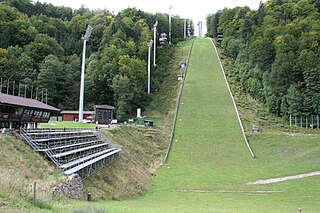
Heini-Klopfer-Skiflugschanze is a ski flying hill in Oberstdorf, Germany, opened in 1950. Hill was twenty years later renamed after a local, its constructor Heini Klopfer.
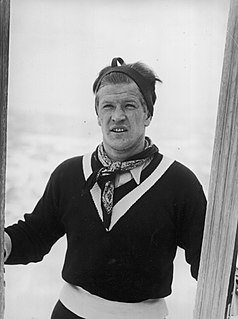
Birger Ruud was a Norwegian ski jumper and alpine skier.

Stanisław Marusarz ; 18 June 1913 – 29 October 1993) was a Polish Nordic skiing competitor in the 1930s.
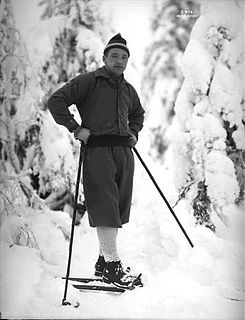
Jacob Tullin "Tulla" Thams was a Norwegian Olympian, who competed in ski jumping and sailing.

Villars-sur-Ollon, commonly referred to as Villars, is a village in Switzerland in the canton of Vaud, part of the municipality of Ollon.
The men's ski jumping at the 1928 Winter Olympics took place at the 70-meter (230 ft) Olympiaschanze in St. Moritz, Switzerland, on 18 February. Thirty-eight competitors from thirteen nations competed, with the event being won by Norway's Alf Andersen ahead of countryman Sigmund Ruud and Czechoslovakia's Rudolf Burkert.
Andreas Däscher is a Swiss former ski jumper who is best known for developing the parallel style, or Däscher technique, in the 1950s. This technique became widely used throughout ski jumping until the early 1990s.

Asbjørn Ruud was a Norwegian ski jumper. Together with his brothers Birger and Sigmund he dominated international ski jumping in the 1930s. Ruud won a gold medal at the 1938 FIS Nordic World Ski Championships. Eight years later, he won the ski jumping competition at the Holmenkollen ski festival, the first held since the German occupation of Norway in 1940 during World War II. At the 1948 Winter Olympics in St. Moritz, Ruud finished seventh in the individual large hill competition. For his ski jumping effort, he earned the Holmenkollen medal in 1948, the second of the three Ruud brothers to do so.

Sigmund Ruud was a Norwegian ski jumper. Together with his brothers Birger and Asbjørn, he dominated ski jumping in the 1920s and 1930s.
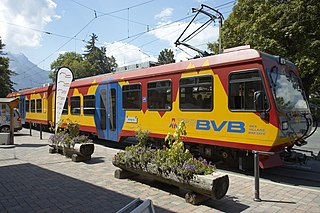
The Bex–Villars–Bretaye Railway is a metre gauge railway line operating between the towns of Bex and Villars-sur-Ollon and the Col de Bretaye mountain pass, situated in the Chablais region of southwest Switzerland. It is, in fact, two railways, one mixed adhesion and rack worked between Bex and Villars-sur-Ollon, the other, linking Villars to the Col de Bretaye being worked on the Abt rack system. Passengers making the full journey are required to change trains at Villars.

Bloudkova velikanka, also Bloudek-Rožmanova velikanka, is a large ski jumping hill in Planica, Slovenia, originally opened in 1934. In 2001 the hill collapsed and was completely rebuild in 2012. Next to the large hill, they also built a brand new normal hill to replace the old demolished one. A total of ten world records were set at the venue in the 1930s and 1940s.

Nels Nelsen Hill is an abandoned ski jumping hill located in Mount Revelstoke National Park near the town of Revelstoke, British Columbia, Canada. The original hill, Big Hill, was built in 1916 and was the first permanent ski jump in Canada. By 1933, three world length records had been set on the Big Hill. It fell out of use in 1939, with Revelstoke instead using the Big Bend Ski Jump.
Vikkollen was a K80 ski jumping hill in Mjøndalen, Norway opened in 1914. It was owned by Mjøndalen IF.

Trampolino Gigante Corno d'Aola is an abandoned K90 ski jumping hill in Ponte di Legno, Italy opened in 1929.
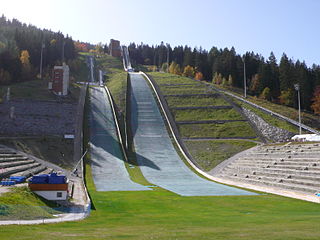
Tremplin du Praz is a ski jumping hill at Le Praz in Courchevel, France. The complex consists of four hills: a large hill with construction point of K125 (HS137), a normal hill at K90 (HS96), and two training hills at K60 and K25. The complex also has a cross-country skiing stadium used for Nordic combined. Jörg Ritzerfeld holds the large hill winter record of 134.0 metres and Nicolas Mayer the normal hill record of 100.5 metres.

Planica 1934 refers to a ski jumping event with national championships held on 4 February 1934 and the first international event on 25 March 1934 in Planica, Drava Banovina, Kingdom of Yugoslavia.

Planica 1936 was a ski jumping event, considered as the birth of ski flying, held on 15 March 1936 in Planica, Drava Banovina, Yugoslavia. Total of 16,000 people gathered to watch the competition.
New Bolgenschanze is an abandoned K74 ski jumping hill at Davos, Switzerland from 1928. It was located on the same road as old Bolgenschanze, approximately 500 meters away.
Curry Hill was a K50 ski jumping hill located in Ironwood, Michigan, United States with two official world records set. It was operated by Ironwood Ski Club and Norrie Athletic Club.












